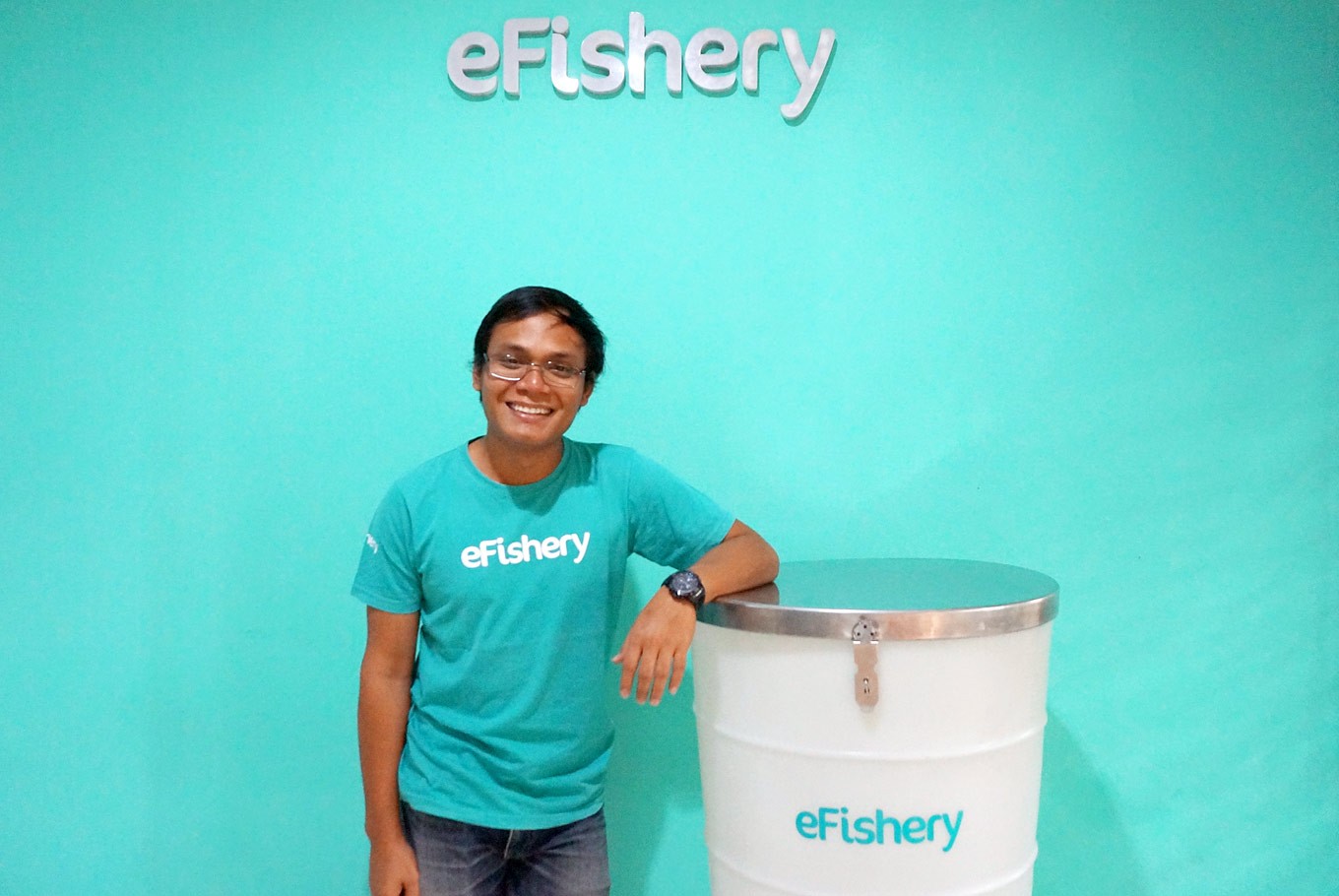Popular Reads
Top Results
Can't find what you're looking for?
View all search resultsPopular Reads
Top Results
Can't find what you're looking for?
View all search resultsGibran Huzaifah: Fish farming maverick
Now, the 29-year-old is a CEO of a promising Internet of Things (IoT) startup that has brought innovation to over 1,000 fish and shrimp ponds in the country.
Change text size
Gift Premium Articles
to Anyone
B
y the age of 29, Gibran Huzaifah has successfully brought about a sea change in the country’s aquaculture industry with his smart fish feeder, eFishery.
Behind his calm manner, there are many surprising things about Gibran Huzaifah.
The fish farmer-turned-tech entrepreneur comes from a humble family with no aquaculture background — he started farming catfish simply to make extra money when he was pursuing his bachelor’s degree in biology at the Bandung Technology Institute (ITB) in West Java.
In 2012, Gibran invented the first prototype of a data-driven fish feeder in a bid to make the fish-farming business more accountable, efficient and convenient.
Now, the 29-year-old is a CEO of a promising Internet of Things (IoT) startup that has brought innovation to over 1,000 fish and shrimp ponds in the country.
At eFishery headquarters, nestled in a serene housing complex in Bandung, Gibran reminisced about the early days in creating the smart fish feeder.
“[The challenge was] to create hardware for a sector that was largely untouched by technology,” said Gibran, who has made the Forbes’ 30 Under 30 Asia 2017 list.
Fish feed represents around 70 percent of fish-farming overheads. Gibran saw problems in the farmers’ manual, unmeasured feeding method. Underfeeding meant underweight or dead fish. Overfeeding negatively affected the fishes’ health and farmer’s profit margins.
Gibran and his team did everything they could imagine to solve this problem. The result was an affordable, data-driven feeder that uses sensors to assess fishes’ appetite and appropriate feed amounts. The feeder automatically sends real-time reports on consumption to the farmer’s smartphone.
He said the eFishery feeder could double farmers’ profits, yet many fish and shrimp farmers had no interest in the smart feeder.
“The farmers never used technology. For many of them, their first interaction with a smartphone was when they tried out our feeder,” Gibran said.
This tech illiteracy, however, was not the only problem. As Gibran describes it, the farmers had their own way of making business decisions.
“Sometimes, they can be purely irrational. For instance, they chose a particular fish feed not because it was the best product, but simply because they had a good relationship with the salesperson. When we realized this, we tried a similar approach.”
Gibran and his 50-strong team position themselves as friends who listen to the farmers’ woes, and as their friendship grows stronger, Gibran offers his products. Slowly but surely, more farmers have dipped their toes in the technology.
“We talk in a simple language to them,” Gibran said. “I would say, ‘If you use this product, you can earn bigger profits, enough for you to go on the haj’.”
Now, eFishery is riding a wave. It has won numerous awards and undisclosed funding from Aquaspark, an Utrechtbased aquaculture investment fund, and Indonesian venture capital firm Ideosource.
The startup is currently serving over 150 aquaculture farmers and firms who operate a total of 1,300 fish and shrimp ponds across Java, Lampung and West Nusa Tenggara.
There is still ample room for eFishery to grow in Indonesia — home to 3.5 million farmers and 1.5 million enterprises in the fish and shrimp farming sector.
Gibran has set his eye on expanding eFishery’s market into the biggest fish-farming countries, such as China, India, Vietnam and Thailand, in the next five years.
But for now, Gibran is paying attention to tapping the Bangladesh market — a country with high domestic fish consumption, with the support of the United States Agency for International Development (USAID). eFishery received this support after winning USAID’s Tech4Farmers Challenge last year.
The expansion plan provides Gibran with a challenge to design a fish feeder that can work amid the lack of mobile connectivity and electricity in Bangladesh.
“Such a feeder will be useful for the Indonesian market too, particularly for floating fish-culture cages in lake areas where electricity is scarce.”
Technology-wise, eFishery has evolved greatly since its initiation. Back then, Gibran and his team created different algorithms to regulate the feeding system of each fish and shrimp species. Now, they have replaced the algorithms with machine learning.
“We found that algorithms were not really accurate. Carp in Bogor and Lampung have different feeding patterns as a result of different water debits, pond environments and fish eggs,” he explained.
With machine learning, data collected from the pond will be sent to eFishery machine-learning cloud software, which later will produce an algorithm especially for the pond.
Gibran also plans to use the data gathered from the ponds to help banks set a credit rating for fish farmers, who are largely still unbanked.
“We want to be a marketplace that connects farmers with lenders. By looking at our data, banks can see the farmers’ track record and the performance of their every fishpond.”
eFishery has forged cooperation with a peer-to-peer (P2P) lender and a financial institution, and is expected to roll out the beta version of the credit-rating system in the next couple of months.
Asked about his reason for basing eFishery in Bandung instead of his hometown of Jakarta, Gibran candidly answered: “I don’t like sweltering, traffic-jammed Jakarta.”
The affordable living in Bandung is an added bonus since it has reduced tremendously the company’s operating costs.
“Our annual operating costs are equal to the monthly operating cost of a Jakarta-based startup.”
On the downside, its location in Bandung also poses a challenge for eFishery in attracting Jakarta-minded tech talent but Gibran does not worry about this.
“Major tech firms can offer a huge salary for fresh graduate engineers. It is impossible for us to compete with that. So, our approach is to look for talent that shares the same passion as us, who want to make a real impact [on society] not every startup can offer that,” he says.
“In the end, we have talented people who share the same values as us.”











